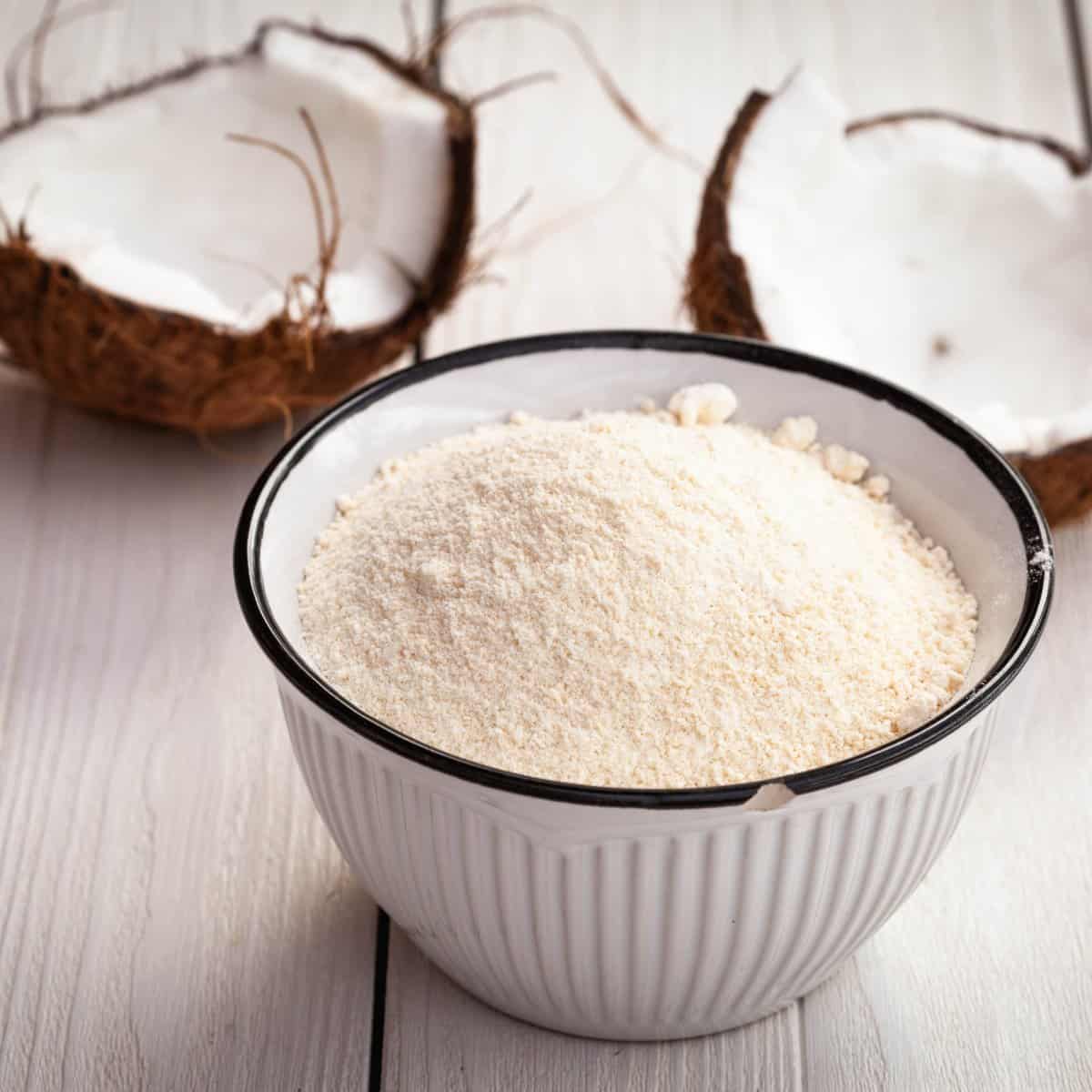Coconut Flour: The Healthy & Delicious Alternative Flour You Need to Try
Coconut flour is a great alternative to wheat flour for baking because it’s high in fiber and low in carbs. But what exactly is it?
Coconut flour is flour made from dried coconut meat. It’s high in fiber and low in carbs, and it’s gaining popularity as a gluten-free alternative to wheat flour in baking. But how does it compare?
Coconut flour is a unique alternative to wheat flour because it’s high in fiber and low in carbs. It’s gaining popularity as a gluten-free baking alternative. But how does it compare? Let’s look at the differences.


Check out our new cookbook
Bitemybun's family recipes with complete meal planner and recipe guide.
Try it out for free with Kindle Unlimited:
Read for freeIn this post we'll cover:
Coconut Flour: The Natural and Versatile Alternative to Grain Flour
Coconut flour is a fine, grain-like powder made from dried coconut meat. It is a popular alternative to traditional grain flours and is highly versatile in cooking and baking. Coconut flour is a low-carbohydrate, high-fiber, and protein-rich ingredient that is suitable for many diets.
How to Use Coconut Flour in Cooking and Baking?
Coconut flour is a versatile ingredient that can be used in a variety of recipes. Here are some tips on how to use coconut flour in your kitchen:
- Coconut flour absorbs liquid more than traditional grain flours, so it’s best to use it in recipes that require a lot of moisture.
- When using coconut flour in recipes, it’s best to use it in combination with other flours to achieve the desired texture and consistency.
- Coconut flour is commonly used in gluten-free and paleo recipes as a substitute for traditional grain flours.
- Coconut flour can be used in both sweet and savory recipes, such as pancakes, muffins, bread, and even as a coating for chicken or fish.
Coconut Flour: A Unique and Flavorful Alternative
Coconut flour is a high-fiber, low-carbohydrate flour that is ideal for those looking to reduce their carbohydrate intake. It is also naturally gluten-free, making it a great option for those with gluten sensitivities or celiac disease. Some of the nutritional benefits of coconut flour include:
- High fiber content: Coconut flour is high in fiber, with about 5 grams of fiber per tablespoon. This can help promote healthy digestion and keep you feeling full for longer.
- Low carbohydrate content: Coconut flour is low in carbohydrates, with only about 2 grams of net carbs per tablespoon. This makes it a great option for those following a low-carb or ketogenic diet.
- Rich in healthy fats: Coconut flour is high in healthy fats, including medium-chain triglycerides (MCTs). MCTs are easily digested and can provide a quick source of energy for the body.
Get Creative in the Kitchen: Cooking With Coconut Flour
Coconut flour is made from the pulp of the coconut after it has been pressed for coconut milk. It is a gluten-free, high-fiber alternative to wheat flour that has gained popularity in recent years. Here are some things to keep in mind when cooking with coconut flour:
- Coconut flour is highly absorbent and requires more liquid than other flours.
- It has a natural sweetness, so you may need to adjust the amount of sugar in your recipe.
- Coconut flour can be dense and heavy, so it’s important to use the right amount in your recipe.
Baking With Coconut Flour
Baking with coconut flour can be a bit tricky, but with some practice, you can create delicious and healthy baked goods. Here are some tips to get you started:
- Use a 1:4 ratio of coconut flour to liquid. For example, if your recipe calls for 1 cup of flour, use 4 cups of liquid.
- Coconut flour works best in recipes that call for a small amount of flour, such as muffins or pancakes.
- To avoid dryness, add extra eggs or egg whites to your recipe.
- Coconut flour can burn easily, so keep an eye on your baked goods in the oven.
Recipes to Try
Coconut flour can be used in a variety of recipes, from sweet to savory. Here are some ideas to get you started:
- Coconut flour pancakes: Mix together 1/4 cup of coconut flour, 2 eggs, 1/4 cup of milk, and 1/4 teaspoon of baking powder. Cook on a greased skillet until golden brown.
- Coconut flour banana bread: Mix together 1/2 cup of coconut flour, 3 ripe bananas, 3 eggs, 1/4 cup of honey, and 1 teaspoon of baking soda. Bake in a greased loaf pan at 350°F for 45-50 minutes.
- Coconut flour chicken tenders: Mix together 1/2 cup of coconut flour, 1 teaspoon of paprika, 1/2 teaspoon of garlic powder, and salt and pepper to taste. Dip chicken tenders in beaten egg and then coat in the coconut flour mixture. Bake in the oven at 400°F for 15-20 minutes.
Why Coconut Flour is a Superbly Healthy Alternative to Wheat Flour
Coconut flour contains a high amount of fiber, which plays a significant role in maintaining good digestive health. Compared to typical wheat flour, coconut flour has a lower carbohydrate content, making it an excellent substitute for those looking to control their glucose levels. It is worth noting that coconut flour does contain carbohydrates, but the type of carbohydrates it contains is unique and appears to have a lower glycemic index than other types of carbohydrates.
High in Protein and Essential Fats
Coconut flour is an excellent source of protein, providing numerous health benefits. It contains all the essential amino acids that the body needs to function correctly. Additionally, coconut flour is rich in healthy fats, which are essential for maintaining good heart health. The fat profile of coconut flour is slightly different from other types of flour, making it a better option for those looking to maintain a healthy heart.
Potential Health Benefits
Research data suggests that adding coconut flour to your diet may provide numerous health benefits, including:
- Lower risk of heart disease
- Longer-lasting energy
- Better control of blood sugar levels
- Increase in overall health and well-being
The Process of Producing Coconut Flour
Coconut flour is produced by grinding the meat of the coconut following a specific method. The coconut meat is dried and ground into a fine powder, resulting in pure coconut flour. The process takes longer than typical wheat flour production, but the end result is worth it.
The Key Takeaway
Coconut flour is a superbly healthy alternative to wheat flour, providing numerous potential health benefits. It is rich in fiber, protein, and essential fats, making it an excellent addition to any diet. When looking for coconut flour, it is important to check the ingredients and choose a brand that is marked as pure coconut flour.
Conclusion
So, coconut flour is a great alternative to traditional flour for baking and cooking. It’s high in fiber and protein, and low in carbs, making it a great addition to a healthy lifestyle.
Plus, you can use it in so many delicious recipes, from pancakes to muffins to bread and more. So, don’t be afraid to experiment with it and enjoy all the benefits it has to offer.
That’s all you need to know about coconut flour.
Check out our new cookbook
Bitemybun's family recipes with complete meal planner and recipe guide.
Try it out for free with Kindle Unlimited:
Read for freeJoost Nusselder, the founder of Bite My Bun is a content marketer, dad and loves trying out new food with Japanese food at the heart of his passion, and together with his team he's been creating in-depth blog articles since 2016 to help loyal readers with recipes and cooking tips.
